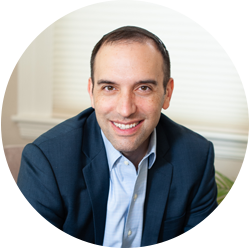Shalom Chaverim,
In normal years, there’s something cathartic about taking down our Sukkah at the end of the holiday season. The deconstruction of the physical structure mirrors the winding down of this period of heightened intensity and there’s a sense that we are ready to return to a normal rhythm.
Of course, things feel different this year. The holidays have ended, but nothing about life feels “normal.” Working remotely continues to keep many of us physically disconnected from colleagues and friends with whom we normally spend every day. With no end in sight to this pandemic, we regularly check whether trends — of public health and the economy — are going in the right or wrong direction. Daily instances of racism, antisemitism, bigotry, and hate test our faith as to whether the better angels of our human nature will ultimately prevail. With less than three weeks to go before Election Day, the toxicity of our politics and regular attacks on the pillars of our democracy are painful and frightening.
This is not normal. It is hard not to feel helpless in the face of deep, systemic, historic problems.
When things feel overwhelming, two things comfort me: learning and action.
In terms of action, I try to remind myself that there is always something we can do to make things even a little bit better, and that small acts of good do add up to significant positive change in the world. For example, I recently joined a virtual meeting for a voter mobilization organization — one of many nonprofits committed to protecting and restoring our democracy — and just making a small donation created a palpable sense of hope for many of the attendees. The power of tzedakah (the Jewish term for charity, which shares a linguistic root with the word for justice) is not only its impact on the receiver, but also the way it can transform the giver from a passive observer to an active repairer.
During an election season, the simple action of voting fulfills our civic responsibility and makes a personal contribution to keeping our democracy strong. This year, we can also keep ourselves and others healthy by voting early, voting by mail, or voting safely in person. It’s a double-mitzvah!
For me, action is always more meaningful when it is rooted in learning, so I often look to our Jewish tradition for wisdom and insight about the moment we are in. This week, we begin again the annual reading of the Torah with the Book of Genesis and the story of creation. I find myself drawn to one verb that repeats itself throughout the first chapter on every day of creation: “Vayomer — And (God) said…”
Jewish interpersonal ethics include speech because of the pain words can cause and the damage they can do. With this phrase, “And God said, ‘Let there be light’,” Genesis presents the theology behind the ethics: God speaks the world into being. From the very beginning of creation itself, our tradition is clear: what we say and how we say it matters.
Speech is also one of the most powerful tools of leadership. Think of our leaders throughout American history who have used their words to reflect the best in our nature and to create a picture of the better tomorrow for which we ought to strive: “We hold these truths to be self-evident” … “With malice toward none; with charity toward all” … “The only thing we have to fear is fear itself” … “Ask not what your country can do for you” … “I have a dream” … "It takes a village" …
Words have both the power to create and to destroy; they can make order and they can wreak chaos; they can dignify and they can degrade; they can motivate and they can demoralize; they can clarify and they can obfuscate; they can unite and they can divide.
Perhaps this year the Torah is asking and challenging us: How can we use our voices — our words and the power of our speech — for good? Every time we open our mouths, every one of us can participate in this powerful tikkun (repair) for the brokenness of our politics and fraying of our civic life.
Shabbat Shalom,
Rabbi Marc Baker

About the Author
CJP President and CEO Rabbi Marc Baker is an educator, writer, and leadership mentor who is devoting his life to Jewish learning and building Jewish communities.
